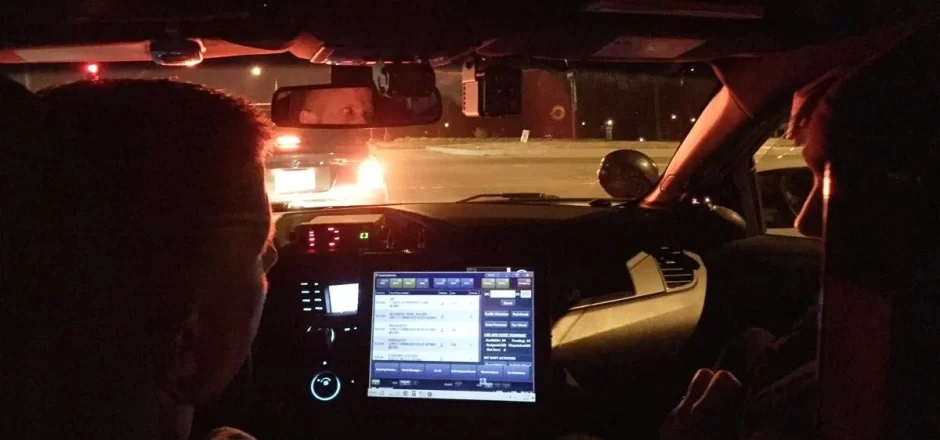|
|
Last
Modified on
May 07, 2025
Officers Tim Fillpot (left) and Kari Mutschler on a Friday night in Kansas City looking for drunk drivers. Fatal accidents are up 37 percent this year in the city, and police aren’t sure why.
[P]olice are also dealing with a huge spike in traffic fatalities. And as the year comes to an end, police aren’t really sure why there have been so many.
On a recent Friday night in east Kansas City police have fanned out in what the Kansas City Police Department calls a “wolf pack.”
It’s an operation funded by the Missouri Department of Transportation (MoDOT) and aimed at arresting drunk drivers.
Tim Fillpot, whose specialty is arresting impaired drivers, and his partner Officer Kari Mutschler are among the half dozen officers working the wolf pack.
While taking drunks off the road is clearly good, nobody knows whether that will cut into the fatal accidents that have plagued the city this year.
“Kansas City is on an island. We are at an accelerated rate for fatalities and the rest of the state appears to be down with their fatality numbers,” says Major Roger Lewis who recently took over the traffic division.
So far this year 93 people have died in accidents in Kansas City, Missouri. That’s a 37 percent increase over last year.
Across Missouri, fatal accidents are actually down three percent, according to the Highway Patrol website.
This spike has baffled the upper reaches of the KCPD.
The most puzzling thing is that while deaths are up, the number of accidents has remained steady.
Lewis has some observations from his own commute down U.S. 71.
“I see aggressive driving. Distracted driving and, quite frankly, just careless driving. Speeders, people rushing in and out between various lands, trying to get ahead of traffic on a very regular basis.” Aggressive but not road rage, Lewis says.
The department may not know exactly why fatalities have skyrocketed, but it’s not sitting still.
For one, it’s sending commanders to community groups to talk about safety and listen to citizen input.
Early one morning, Capt. Joe Crayon talked to MainCor, an economic development group in midtown. “Part of the reason we think might be that people aren’t seeing enough police cars around and they’re not seeing enough people getting stopped,” he told about a dozen people.
Department statistics certainly bear that out. The number of tickets written is down about 50 percent from last year.
Fillpot and Mutschler didn’t catch any drunk drivers on their patrol. In fact, the wolf pack this night would nab just two people.
For years, the KCPD would use state grant money to run DUI checkpoints, but last year, the legislature banned checkpoints, saying the wolf packs are more efficient.
Not so says Fillpot, a 15 year veteran of KCPD. “I enjoy doing both. I think there is more of a deterrence and a higher turnout of arrests doing the sobriety checkpoints,” he says.
Is the lack of checkpoints the reason fatalities have spiked? Maybe. Not enough tickets being written? That’s also possible.
And here’s an odd fact: police say when homicides rise so do fatal accidents. Why? Nobody knows.
It is a problem without an obvious solution, says Lewis. “We do feel a little less in control, if you will, of actually being able to have the same impact on careless and aggressive driving within the thousands of square miles of roadways that we have in this city.”
Whatever the reason, police are worried as we approach Christmas and New Years.









